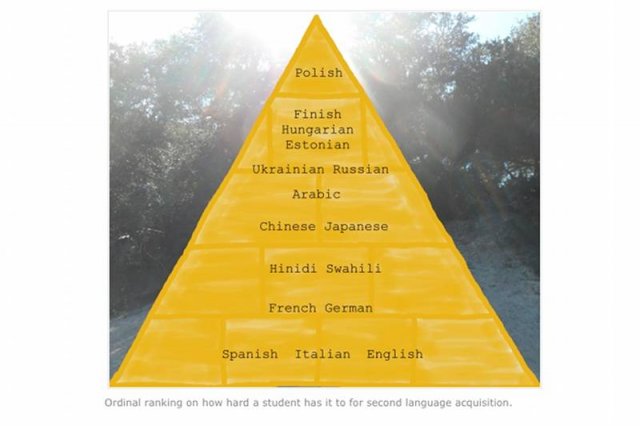Angela
Elite member
- Messages
- 21,823
- Reaction score
- 12,329
- Points
- 113
- Ethnic group
- Italian
Do you gentlemen know what "sour grapes" means? How about "fighting a losing battle"? Or "tilting at windmills"? Or "too bad, so sad"? How about "suck it up and get over it"? Or, "it's time to join the winning side"? Or "an exercise in futility"? I love the pragmatism and no nonsense attitude you can see in these kinds of phrases.
I thought it was time to interject a little sanity and have some fun with this.
More seriously...
"English has become a universal language. There are many reasons for its dominance: the heritage of the British Empire, and the post-world-war economic hegemony and cultural influence – ranging from Mickey Mouse and Marilyn Monroe to Elvis Presley and Snoop Dogg – of the United States.
But the main reason is the elasticity of the language and the broad-mindedness it communicates. If English grammar is rudimentary, the linguistic equivalent of rock’ n’ roll, the English vocabulary is huge. There are very few things that can’t be expressed in English, and if it can’t be said in English then a word is lifted from another language – like "kindergarten," for example. If it doesn’t exist in English and a word isn’t lifted from another language it’s because what it represents doesn’t make sense to thinking shaped by the English language: a case in point, "Schicksalsgemeinschaft" (companions in fate).The predominance of English in sciences, economy, culture and politics is overwhelming. In Palestine, in the days of Jesus of Nazareth, Latin was the language of the military and government. But to be considered educated you had to speak Greek; if you were Jewish you also had to speak Hebrew; and the language of the masses was Aramaic. In the Europe of the late Middle Ages, Latin was the language of the erudite, Italian the language of trade, and blossoming cultures used their own respective languages..."
http://carloz.newsvine.com/_news/2013/01/29/16755280-why-the-english-language-dominates-the-world
Keep your native languages by all means. Console yourselves with the thought that they are superior if it makes you feel better. The fact remains that in today's world you have to master English, not only for trade and commerce, science and technology and travel, but for diplomacy, and for culture. Learn it or get left behind. That may seem harsh, but it's true.
Another more productive area of discussion was alluded to in the above quote. Language not only reflects culture, it also shapes thinking and thereby creates culture. Certain words are indeed not adopted into English, such as "companions of fate", because the concept is antithetical to the positive, pro-active, individualistic and pragmatic culture of English speakers. Perhaps with the adoption of English some of the passive, resigned, ossified thinking of other groups of people will change.
I thought it was time to interject a little sanity and have some fun with this.
More seriously...
"English has become a universal language. There are many reasons for its dominance: the heritage of the British Empire, and the post-world-war economic hegemony and cultural influence – ranging from Mickey Mouse and Marilyn Monroe to Elvis Presley and Snoop Dogg – of the United States.
But the main reason is the elasticity of the language and the broad-mindedness it communicates. If English grammar is rudimentary, the linguistic equivalent of rock’ n’ roll, the English vocabulary is huge. There are very few things that can’t be expressed in English, and if it can’t be said in English then a word is lifted from another language – like "kindergarten," for example. If it doesn’t exist in English and a word isn’t lifted from another language it’s because what it represents doesn’t make sense to thinking shaped by the English language: a case in point, "Schicksalsgemeinschaft" (companions in fate).The predominance of English in sciences, economy, culture and politics is overwhelming. In Palestine, in the days of Jesus of Nazareth, Latin was the language of the military and government. But to be considered educated you had to speak Greek; if you were Jewish you also had to speak Hebrew; and the language of the masses was Aramaic. In the Europe of the late Middle Ages, Latin was the language of the erudite, Italian the language of trade, and blossoming cultures used their own respective languages..."
http://carloz.newsvine.com/_news/2013/01/29/16755280-why-the-english-language-dominates-the-world
Keep your native languages by all means. Console yourselves with the thought that they are superior if it makes you feel better. The fact remains that in today's world you have to master English, not only for trade and commerce, science and technology and travel, but for diplomacy, and for culture. Learn it or get left behind. That may seem harsh, but it's true.
Another more productive area of discussion was alluded to in the above quote. Language not only reflects culture, it also shapes thinking and thereby creates culture. Certain words are indeed not adopted into English, such as "companions of fate", because the concept is antithetical to the positive, pro-active, individualistic and pragmatic culture of English speakers. Perhaps with the adoption of English some of the passive, resigned, ossified thinking of other groups of people will change.
Last edited:




